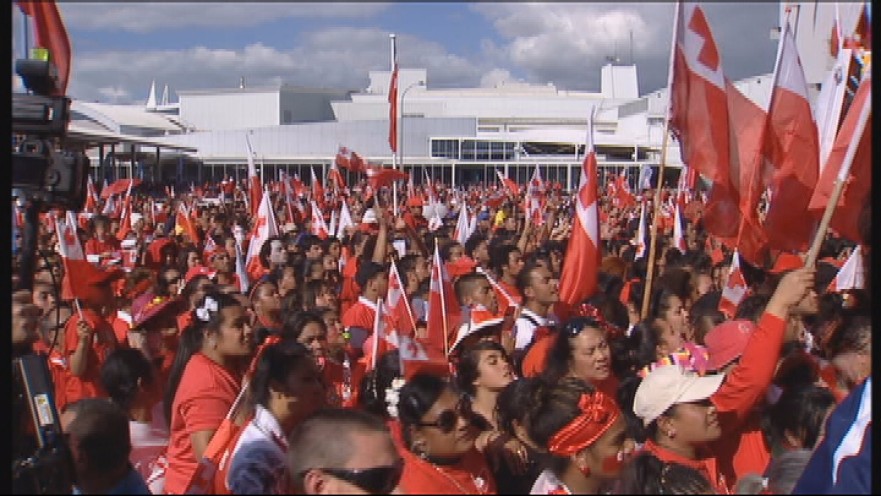Five years ago, as many as 7000 Tongan fans delayed traffic and blocked roads when they turned out to welcome their rugby team at Auckland airport for the Rugby World Cup tournament 2011.
The unique reception by the Tonga fans included dancing on busy roads in Otahuhu in South Auckland to show their support for their team made them a media sensation in New Zealand and around the world.
Tongan-made oil now has a potential global market status after Tongan flagbearer Pita Taufatofua stole the show in Rio with his glistening torso.
Tonga is one of the smallest nations in the world, but the Olympics has exposed the kingdom to millions who watched the opening ceremony on Friday. The international exposure could definitely bring some economic benefits to Tonga, especially in the tourism industry.
Media around the world have claimed Taufatofua was anointed with baby oil, but he has confirmed it was Tongan oil. The practice is called tākai lolo or pili lolo and symbolises warmth (māfana), celebration (kātoanga) and virginity (angamaʻa / taupoʻou).
The Tongan-made oil is a mixture of kakala (fragrant flowers, leaves and bark) and residues with coconut cream.
The quality of their product, like any other body decoration product, depends on what types of flowers and residue are selected.
The kakala is selected according to its scent, how long it lasts and its social status.
They use ahi, langakali and mohokoi and some of the strongly scented kakala to produce an oil of highest quality.
Coconut cream is used because water would damage the quality of the oil.

Kakala
Kakala is divided into two major categories; kakala vale for commoners and kakala ‘eiki for chiefs and the king.
Any presentation of ornaments of kakala to the king and the nobles usually has to be made with kakala ‘eiki.
The same rules apply to the Tongan-made oil.
Making the oil is traditionally a female task because of the belief that women were associated with decorating the body.
Symbols
This is what Dr Tevita.ʻŌ. Kaʻili, an Associate Professor & Department Chair at BYU wrote on Facebook:
Coconut oil is an integral part of indigenous Oceanian body adornment. Typically performers put coconut oil on their body as a celebration of the symmetry of the human body as well as a mark of identity.
The coconut oil is a fusion of coconut and kakala, fragrant plants (flower, leaves, barks), from the performer’s place of ancestral origin. Thus, the coconut oil is an expression of ancestral ties to fonua, land and its people. The coconut has a romantic and mythical origin.
The beautiful Oceanian goddess Hina, the sister of Maui, is linked to the origin of niu, coconut. By the way, the sennit coconut cordage bracelets around his arms are weaved from coconut husks.
The ngatu, decorated tapa cloth, is adorned with intricatem and complex geometrical designs (known as kupesi in Tongan). The designs are abstract symmetrical forms of elements (flowers, plants, marine creatures, birds) from the fonua, environment.
It denotes the deep spiritual oneness of Oceanians and their land. For example, the bottom-front kupesi design on Pita Taufatofua’s tapa appears to be a Veʻetuli design (Footprints of the tuli bird). The Tuli bird, the Pacific Golden plover, is a vessel (vaka) of the Oceanian god Tangaloa. It is an emblem of Oceanians’ unity with nature and with their ancestor Tangaloa, the creator god and god of the ocean and deep sea voyaging (see Cresantia Koya Vaka’uta’s PhD thesis for more info on the tuli bird). Here is my post Anapesi Kaili
Kaniva News comment
Culturally and traditionally, there is a belief that when a Tongan girl dancer’s body is oiled up as part of her decoration for a performance the oil tells whether or not that girl still keeps her virginity. The traditional belief is that if the oil on the body remains glistening until the end of her performance the girl is a virgin. If the oil is applied and quickly disappears and does not glisten or flow, the girl has lost her virginity.
The main points
- Five years ago, as many as 7000 Tongan fans delayed traffic and blocked roads when they turned out to welcome their Olympic team at Auckland airport.
- The unique reception by the Tonga fans included dancing on busy roads in Otahuhu and made them a media sensation in New Zealand and around the world.
- Tonga is one of the smallest nations in the world, but the Olympics has exposed the kingdom to millions who watched the opening ceremony.
- The international exposure could definitely bring some economic benefits to Tonga, especially in the tourism industry.
